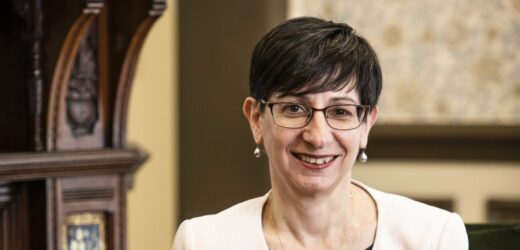Save articles for later
Add articles to your saved list and come back to them any time.
Families are the latest weapon in the private school sector’s fight against the Andrews government’s payroll tax changes, with principals urging parents to pressure their local Labor MPs to reconsider the move.
The head of Victoria’s Catholic schools has written to state Labor MPs, warning them that the education of more than 21,000 students at about 20 schools will suffer if they lose their long-held exemption to payroll tax next year.
Rita Grima, principal of St Columba’s College in Essendon, says the school faces an $800,000 tax bill.
Catholic Education Commission of Victoria executive director Jim Miles said most of the Catholic schools likely to lose the tax exemption were “local secondary schools, with hard-working families who now face fee increases and/or cuts in teaching and learning programs”.
“Our principals in these schools are asking why the families in their diverse communities are being punished to help balance the state budget,” Miles wrote.
“We are asking for you to advocate to your colleagues that the proposal not proceed. At the minimum, the fee threshold at which schools become eligible for payroll tax should be significantly increased.”
About 110 schools deemed high-fee by the government will lose their exemption on July 1, 2024, netting the state a forecast $422 million over three years, according to last week’s budget papers.
The Department of Treasury and Finance said schools that charged fees of slightly more than $8000 a year were likely to lose their exemption. This includes 20 Catholic schools and about 90 independent schools.
Rita Grima, principal of girls’ school St Columba’s College in Essendon, which charges year 11 and 12 fees of $11,050, said the school faced a tax bill of about $800,000.
“This is money we obviously have not budgeted for,” Grima said. “We would need to look at our staffing and programs, our refurbishment plans, and school fees to fill the budget gap.
“We have families from a variety of socioeconomic backgrounds. Why should our families be asked to help balance the state budget?”
Independent schools that expect to have to pay the tax have also called on parents to protest to the government.
Cornish College principal Nicola Forrest wrote to parents on Wednesday telling them the “unfair” tax could have significant impacts on its resources and budget in future years, urging them to contact Labor ministers and MPs.
“The assumption that all independent schools are in a financial position to meet this tax is unrealistic and unfair,” Forrest wrote.
“It is disheartening, to say the least, that the Victorian government sees this as a viable solution to its financial concerns.”
Cornish College, in Bangholme, charges year 11 and 12 fees of $22,296.
Government schools are not exempt from payroll tax.
Dr Emma Rowe, a senior lecturer in education at Deakin University, said there was no good reason for any non-government schools – even low-fee ones – to get an exemption.
“They all get funding from the government, and they all ask for parental fees as well, so why should they enjoy a tax exemption that other public schools don’t?” Rowe said.
Private school leaders who are complaining about possible cuts to programs should investigate the available resources at most public schools, she said.
“I think they should go out and have a look at some of the public schools, speak to public school parents and public school teachers and see what they’re working with. I don’t see why they should have this privilege.”
Victorian government schools are funded to 90.4 per cent of the school resourcing standard, and non-government schools receive 100 per cent of the standard.
Victorian non-government schools have been exempted from payroll tax for decades, and no other state or territory requires them to pay it. The removal of the exemption was announced as part of the state’s $31.5 billion COVID budget repair plan.
An Andrews government spokesperson said: “The government has an established process for separating low-fee from high-fee independent schools. The threshold will be indexed, and we’ll have more to say about which schools will no longer receive the exemption before the new financial year.”
The Morning Edition newsletter is our guide to the day’s most important and interesting stories, analysis and insights. Sign up here.
Most Viewed in National
From our partners
Source: Read Full Article



